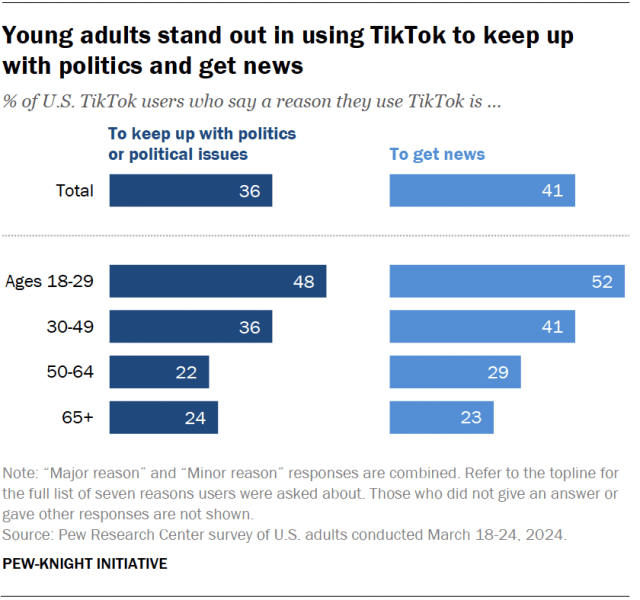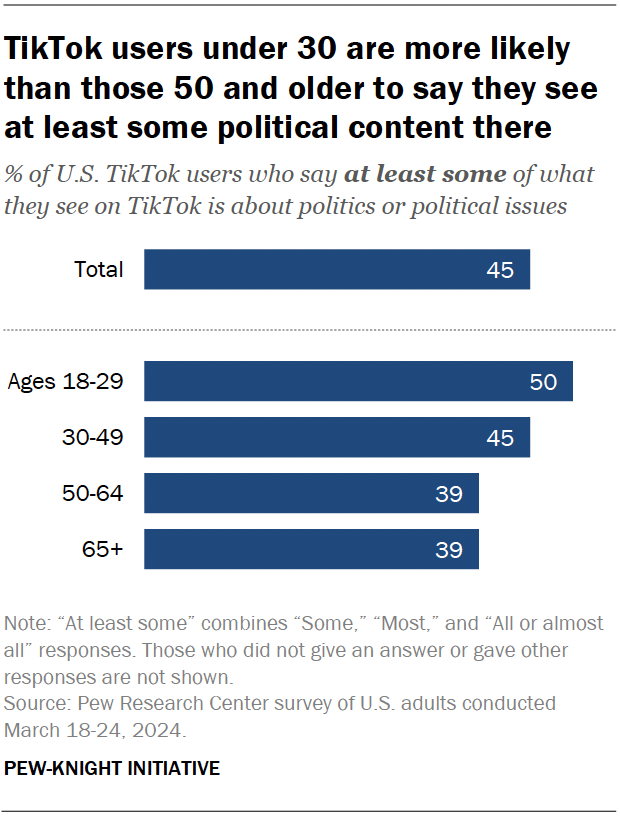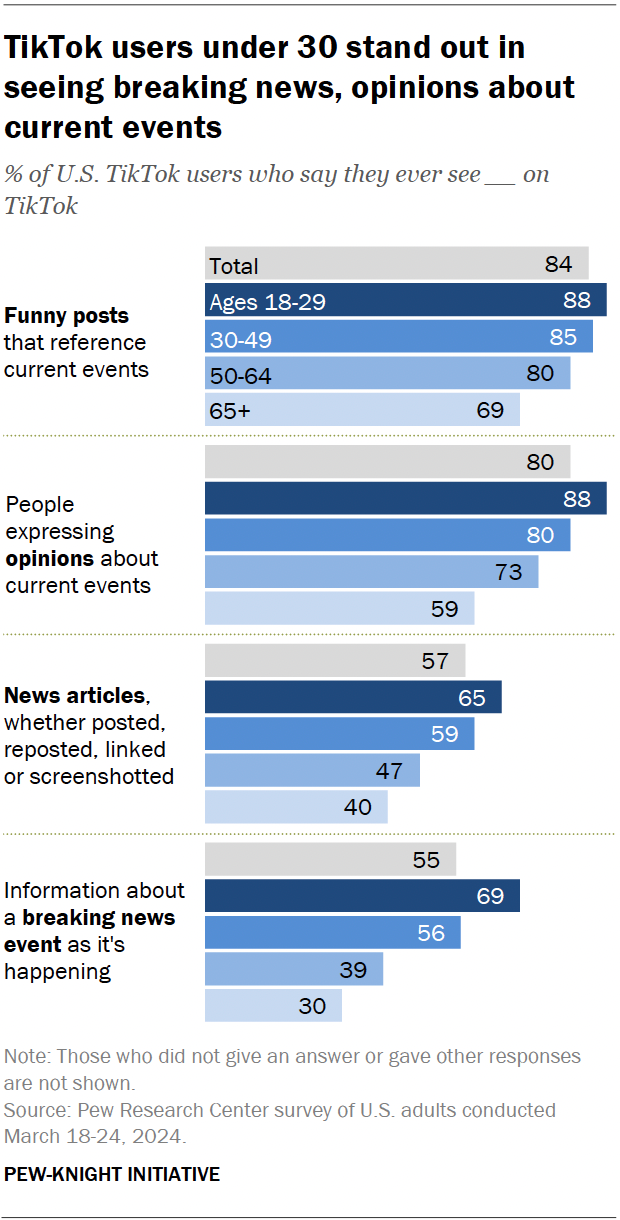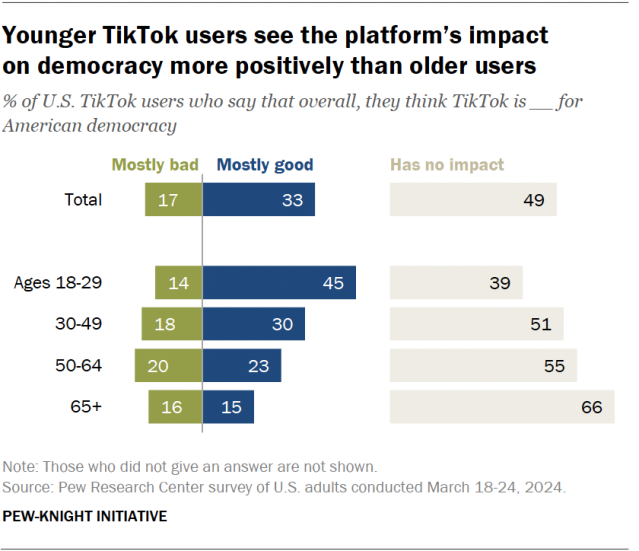The Pew-Knight Initiative supports new research on how Americans absorb civic information, form beliefs and identities, and engage in their communities.
Pew Research Center is a nonpartisan, nonadvocacy fact tank that informs the public about the issues, attitudes and trends shaping the world. Knight Foundation is a social investor committed to supporting informed and engaged communities. Learn more >
TikTok has been so popular among young Americans that presidential campaigns are using it for voter outreach. And some young adults are using TikTok to keep up with politics or get news, a March Pew Research Center survey shows.
Pew Research Center conducted this analysis to understand age differences in TikTok users’ views and experiences on the platform. The questions are drawn from a broader survey exploring the views and experiences of TikTok, X, Facebook and Instagram users. For this analysis, we surveyed 10,287 adult internet users in the United States from March 18 to 24, 2024.
Everyone who took part in the survey is a member of the Center’s American Trends Panel (ATP), an online survey panel that is recruited through national, random sampling of residential addresses. This way, nearly all U.S. adults have a chance of selection. The survey was weighted by combining the sample of internet users with data from ATP members who do not use the internet and weighting the combined dataset to be representative of all U.S. adults by gender, race, ethnicity, partisan affiliation, education and other categories. This analysis is based on those who use TikTok. Read more about the ATP’s methodology.
Here are the questions used for this analysis, along with responses, and the survey methodology.
This is a Pew Research Center analysis from the Pew-Knight Initiative, a research program funded jointly by The Pew Charitable Trusts and the John S. and James L. Knight Foundation. Find related reports online at https://www.pewresearch.org/pew-knight/.
Our survey explored various reasons people might use TikTok and other social media platforms. Young TikTok users stand out from their older peers on several of these reasons, including:

Keeping up with politics or political issues. For 48% of TikTok users ages 18 to 29, this is a major or minor reason why they’re on the platform.
By comparison, 36% of those ages 30 to 49 and even smaller shares of older users say the same:
- 22% of those 50 to 64
- 24% of those 65 and older
Getting news. We also asked TikTok users if getting news in general is a reason they use the platform – regardless of whether that’s political news or another topic entirely. About half of those under 30 say getting news is a major or minor reason they use TikTok.
That compares with 41% of TikTok users ages 30 to 49 who say getting news is a reason they’re on it. The shares of older users saying so are even smaller:
- 29% of those 50 to 64
- 23% of those 65 and older
TikTok has increasingly become a destination for news, bucking trends on other social media sites. A 2023 Center study showed more Americans – and especially young Americans – regularly get news on the platform compared with a few years ago.
For more on what motivates TikTok use – like entertainment, which is a major draw for most TikTok users – read our deep dive into why and how people use the platform.
What people see and share on TikTok

Seeing political content
Nearly half of all TikTok users (45%) say they see at least some content about politics or political issues on the platform. That includes 6% of users who say political content is all or most of what they see.
Half of users under 30 say they see at least some political content on TikTok. That’s higher than the 39% of those 50 and older who say the same. However, the shares of 18- to 29-year-old users and 30- to 49-year-old users who say this are statistically similar.
Sharing political content
As on other platforms we’ve studied, far smaller shares post about politics than see political content on TikTok. About one-in-ten users ages 18 to 29 (7%), 30 to 49 (8%) and 50 to 64 (8%) post at least some political content there. That compares with just 2% of TikTok users 65 and older.
But many users – 63% – post nothing at all.
Only 36% of TikTok users say they ever post or share on the platform. Users ages 30 to 49 are most likely to say this, at 44%. That compares with 37% of those 18 to 29, 26% of those 50 to 64 and 15% of those 65 and older.
Seeing news-related content

Regardless of whether TikTok users say getting news is a reason they’re there, most see humor and opinions about news on the platform:
- 84% say they ever see funny posts that reference current events on TikTok
- 80% ever see people expressing opinions about current events
- 57% ever see news articles posted, reposted, linked or screenshotted
- 55% ever see information about a breaking news event as it’s happening
Users under 50 are more likely than older users to say they ever see each of these.
And TikTok users under 30 stand out further in seeing opinions about current events and information about breaking news. They are more likely than any other age group to ever see these two kinds of content.
TikTok and democracy
Debates around TikTok’s impact on the political environment in the United States – including for young voters specifically – are squarely in the national spotlight. We wanted to understand: Do TikTok users think the platform impacts democracy, and how?

Overall, TikTok users are roughly twice as likely to think it’s mostly good for American democracy as they are to think it’s mostly bad (33% vs. 17%). But the largest share of users (49%) think it has no impact on democracy.
TikTok users under 30 are more positive, however – 45% of this group say it’s mostly good for democracy. That compares with:
- 30% of users ages 30 to 49
- 23% of users 50 to 64
- 15% of users 65 and older
Even among users under 30, 39% say the platform has no impact on democracy. That share increases to 66% among users 65 and older.
The March survey found only minor differences by political party among TikTok users in views of its impact on democracy. Still, as lawmakers attempt to ban TikTok over national security concerns, other Center research has found that views of banning the platform have been sharply divided by political party among the general public.
To learn more about how Americans view and experience TikTok, X (formerly Twitter), Facebook and Instagram, read these companion reports:
- How Americans Navigate Politics on TikTok, X, Facebook and Instagram
- How Americans Get News on TikTok, X, Facebook and Instagram
These Pew Research Center reports and this analysis are from the Pew-Knight Initiative, a research program funded jointly by The Pew Charitable Trusts and the John S. and James L. Knight Foundation.
Note: Here are the questions used for this analysis, along with responses, and the survey methodology.
